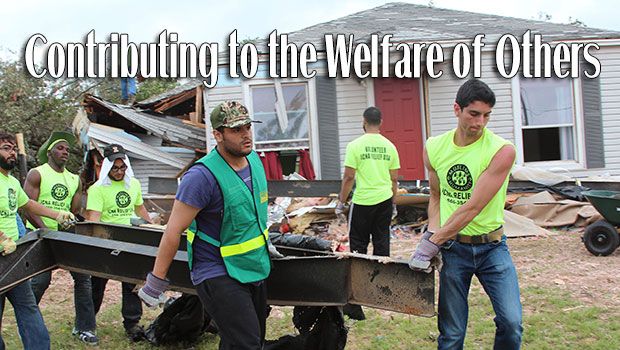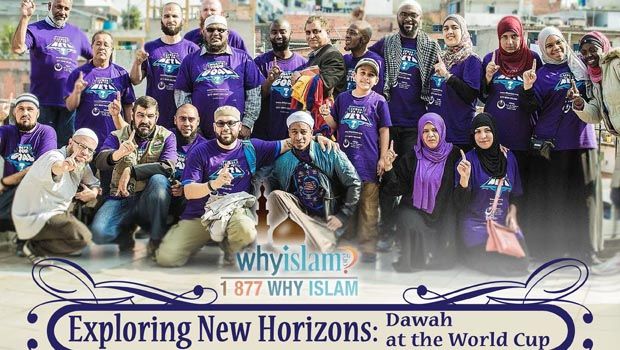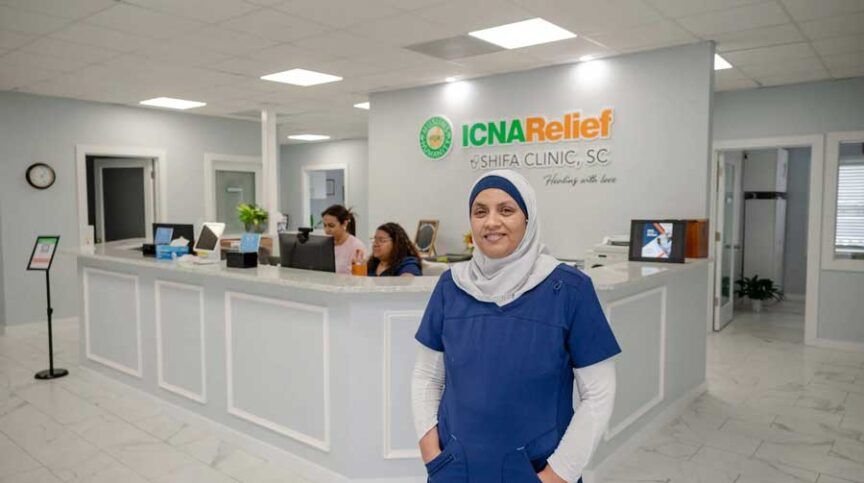Altruism is the unselfish concern and caring for the welfare of others. Some behavioral scientists and philosophers have argued that pure altruism doesn’t exist because the person engaging in the so-called altruistic act experiences gratification in the form of pride or self-satisfaction. Putting that issue aside for now, we can consider whether altruistic feelings are innate to humans. One study which explored this question, published in Psychological Science, involved 56 two-year-old toddlers, who were observed during a staged scenario in which an adult dropped a small object and then struggled to pick it up. Twelve of the toddlers were given the opportunity to help the adult, and out of that group, ten of them went to assist the adult by picking up the object. Toddlers in another group were held back by their parents from helping. And a third group watched as another adult helped the one who dropped the object. The researchers observed the pupils of the children’s eyes before and after the adult dropped the object.Pupils dilate for any number of reasons including when a person feels concern about something, and the toddlers’ pupils did dilate upon seeing the adult struggle to pick up an object.This is interpreted to mean that the children, even at that young age, experienced feelings of sympathy for the adult. The researchers further found that those children who were kept from helping the adult, compared to those who were permitted to intervene and help right away, experienced an intensifying degree of concern and feelings of sympathy. So even very young children feel the impulse to help a person in need and to sympathize with their plight.
If we take as a starting point that altruistic feelings are innate to human beings, and that altruism, by definition, benefits the receiver, we might then wonder if altruism benefits the giver. Self-report surveys have been used in psychological research to probe the effects of altruistic behavior on the one extending help.A study in 2006 found that individuals who indicate a positive regard for, and willingness to engage in, altruistic acts tended to feel happier in their lives. Participants were asked questions about their inclination and readiness to face challenges, make sacrifices, or even suffer in order that the people they loved could avoid the same difficulties. Those who scored the highest in altruistic inclinations rated their own lives and relationships as “very happy.” In another study, in which brain activity was monitored by MRI, participants were instructed to imagine scenarios in which they could help another person, extend kindness, be charitable – in essence, act in some sort of benevolent way.The pleasure center in the brain lit up as participants imagined such scenarios.
The correlation between benevolent action and the experience of pleasure or happiness was corroborated by researchers at Harvard University. They surveyed nearly 30,000 people on the civic engagement of Americans. The “Social Capital Community Benchmark Survey” found that people who contributed time (volunteering) or moneyfelt a stronger connection to community and were 42 percent more likely to be happy than those who were more alienated from a sense of community. This is not surprising. Studies show that engaging in charitable work produces a “helper’s high,” a state of elevated pleasure that is produced when endorphins are released in the brain.
When we give of ourselves to provide relief, betterment, comfort, or provision to others, we can experience that same depth of spiritual felicity
In the 1950s, researchers at Cornell University began a long-term survey of married women with children, with a focus on the correlation of the woman’s number of children and stress, and its effect on health and longevity. They found, after 30 years, that the number of children, the woman’s education, socio-economic class, or work status did not correlate significantly with health and longevity. But 52 percent of the women who did not do any volunteer work experienced a major illness.In comparison,a lesser number of women, 36 percent of those who did any sort of volunteer work, had major health issues.Similar findings on the benefit of volunteering were indicated in a study that looked at older adults. Those who engaged in volunteer work lived longer than those who didn’t. And one study showed a 44 percent reduction in early death among those who volunteered a significant amount of time.
The Most Beloved People
There are numerous verses in the Quran and instructions from the Prophet (peace be upon him) about helping the needy, being compassionate, and acting in ways that alleviate the difficulties and sufferings of other people. The Prophet said, “The most beloved people to Allah SWT are those who help and benefit others the most…” The Prophet then went on to talk about relations between Muslims: “…and the most beloved actions to Allah are to bring joy and happiness to a Muslim, or to relieve him from a hardship, or to pay his debt, or to remove his hunger; and indeed to work to help any Muslim brother [or sister] verily is more beloved to me than to devote a whole month in retreat in this masjid for worship without interruption”(Al-Tabarani).
Imam Hassan Al-Banna (may Allah have mercy on his soul) said the following about taking action to relieve people of pain and misery: “I believe that the best souls are those who see their happiness in making other people happy. This soul derives its joy from increasing the joys of other people and protecting them from any harm. This virtuous soul is able to penetrate to the deepest core of their hearts and feel their pain and contribute to their healing; and to understand what is in society which has disturbed their well-being. This soul feels nothing but mercy for all the sons of Adam and has a sincere and pure desire to exert whatever efforts will cure their ill hearts and expand their chests with joy…”
Heart felt Charitable Actions
With mass communications, instant and constant news coverage of happenings around the world, and access to the internet, we are all acutely aware of the tremendous amount of suffering in the world each and every day. Every person, even those with modest means, should want to contribute something of their time, effort, or other resources to help relieve the suffering all around us. Volunteering to do relief work, choosing a career that provides services to the needy, getting involved politically in order to promote social justice, raising one’s own children in a loving, kind, and wise way – all of these contribute to the common good, directly or indirectly. A deep, heartfelt compassion moves a person to contribute to the welfare of the people and the society in general.
There is a very moving story about a devout and scholarly man, Sufian ibn Uyaiynah, one of the tabaeen (the generation of Muslims that came after the companions of the Prophet). One day a beggar knocked at the door of his house. Sufian’s family were poor but he gave the destitute man what little he had and told him that he would make dua for him. After he shut the door, he started to cry and his wife, touched by his emotion, said to him, “You gave him what you could and Allah SWT will reward you for your kind heart and generosity.” Sufian said to his wife, “I am crying because we were heedless, all of us, every one of the people in this town who has a roof over his head and food on his table – all of us are neglectful because we waited until our brother needed to knock on a door asking for help. We should have been actively and ardently identifying whoever is in need so as to fulfil their needs without them having to ask.”
Ego-driven Charitable Actions
The elegant generosity and profound compassion of Sufian ibn Uyaiynah counters the argument that pure altruism doesn’t exist. It is beyond the bounds of plausibility to think that Imam Sufian gave the poor man whatever provisions he had available out of some self-serving or other ego-driven interest. After the man left, and in the privacy of his own home, Sufian cried that the needy man even had to ask someone for help. What a beautiful example of a genuinely altruistic soul! In fact, we know that Islam instructs believers about the impulses of the ego; that the base self, left to its own devices, establishes destructive patterns of thought and emotion out of which comes self-absorbed, self-serving, egotistical behavior. Behaving in a way that contradicts the precepts of Islam is one path the ego takes. Another is acting in public in ways that appear to conform to the teachings of the deen but doing so primarily to aggrandize one’s reputation. Character is real. Reputation is but a shadow pretending to have substance and form. If a person fails to delve into the inner meaning and purpose of Islam as it relates to their own thoughts and emotions and behaviors, then they are deceiving themselves, and others in the process. Islam is then treated as a checklist of duty and ritual rather than a way of wisdom intending to transform life.
There is a long hadeeth Qudsi (a hadeeth which is divinely inspired but in the Prophet’s own words) which gives three examples of individuals who think they have lived their lives righteously, but whose “piety” is superficial and driven by the ego. They have deluded themselves and in each case they are consigned to punishment in the Hereafter. The third example in the hadeeth is “…a man who Allah had made abundantly rich and granted him every kind of wealth. He will be brought and Allah will make known to him His favors and he [the man] will acknowledge them. Allah will say, ‘And what did you do about them.’ The man will say, ‘I spent money in every cause in which You wished that it should be spent.’ Allah will say, ‘You are lying. You did so to be described as a generous fellow.’ Orders will be given against him and he will be dragged face downward and thrown into Hell”(Muslim).
As this hadeeth makes crystal clear, “spending” in the cause of Allah, whether volunteering, giving charity, or helping another person in any sort of way, can be done with a motive to look good in front of people.The Quran says, “So woe to the worshippers, those who are neglectful of their prayers,those who do good deeds only to be seen [admired by others],yet withhold small kindness or assistance!” (Quran 107:4-7).
We’re All in This Together
If we are aware of our thoughts, engage in regular self-scrutiny, carefully formulate our intentions, and choose with deliberation how to behave, then we can engage in altruistic acts that help others and also benefit our higher selves. We can say that altruistic acts that come from the heart benefit our higher selves because Allah SWT tells us that “those who help and benefit others the most” are the people most beloved to Him.
With the distinction between heartfelt and ego-driven charitable actions in mind, we can better understand what Shaykh Sayyid Qutb has said about giving and receiving:”Nothing in my life even comes close to the joy I experience when I give to others, or share with others, or remove hardships from others. There are no words which can express this heavenly joy. Indeed, I don’t worry if death comes now, for I have taken so much from this life; rather I have given so much in this life – and frankly it is difficult to differentiate between the giving and receiving, because in the spiritual dimension they connote the same thing. The profound happiness and heavenly joy, I experience when I give of myself to another must be even greater than the other’s happiness in receiving.” There is no doubt that Shaykh Qutb was speaking about giving and sharing and helping other people with an intention free of selfish interest, that is, acting out of heartfelt altruistic intention.
To say that it is difficult to differentiate between the giving and receiving is acknowledgement that both the giver and the receiver benefit. There is value and blessing to both.Asentiment which has been voiced by many progressive and cognizant leaders and activists is “we’re all in this together.”This inclusive and uniting message speaks to the great weave of life that connects all human beings and the natural world with its intricate and interdependent ecosystems. The worldview at the core of this sentiment directs our attention to the pastso that we can learn from it, and spotlights the futureas an open-ended potential. The future can be a continuation and worsening of the current world paradigm – exploitative, toxic, and savagely violent; orwe can endeavor for more cooperative and life-sustaining constructs. To the degree that ordinary people, in great numbers,demand social justice for all people, a more fair and balanced distribution of wealth, sustainable energy and guardianship of the environment, national security policies that renounce imperialism, and so on, the greater chance the human race can survive and thrive.
The damage done by oligarchs, insanely, compulsively profit-driven corporations, and fully complicit, self-serving politicians cannot be undone unless we realize the unstoppable power of an awakened and organized humanity dedicated to bringing about meaningful change. Those who want to protect the status quo disingenuously characterize the poor as “lazy,” “irresponsible,” “takers,” and “welfare queens.” They mythologize “rugged individualism” as the foundation of success and cunningly credit and admire themselves by insisting that poor people, if only they weren’t so [fill in the blank with any of the above belittlements], could “pull themselves up by the bootstraps.” The fact is that studies demonstrate that poverty, to great extent, is the station one is born into and/or is a result of life setbacks like losing one’s job or experiencing health issues or other exigencies that exhaust one’s resources. Beyond that, there are institutionalized mechanisms in the economic structure that handicap the poor, perpetuate their circumstances of helplessness and hopelessness, and keep them in poverty.
Reciprocity
The maxim – “we are all in this together” – gives due recognition to the triumphs and sorrows that inhabit every corner of the globe. Gregory Boyle, a Jesuit priest, has worked for twenty years in Los Angeles with a gang-intervention program. He writes in Tattoos on the Heart: The Power of Boundless Compassion, “…the truest measure of compassion lies not in our service of those on the margins, but in our willingness to see ourselves in kinship with them.”
Finding kinship with those on the margins was an important lesson for one man who volunteered at a soup kitchen. David found great satisfaction in helping to provide meals to the needy. While he felt compassion for the people who regularly lined up for a free meal, he would say to himself things like, “Poor people. Thank God I have so many good things in my life. I don’t think I could ever end up like this.”He was only semi-conscious of this script that would run through his mind and had no idea that these sorts of statements that he told himself originated from his ego and served to distinguish himself from the needy he served. Often he would survey the room after the last person had been given their meal, saddened at the sight of so many men, women, and families who could not even afford to provide themselves with food in the comfort of home. One day as David watched the multitude eating their meals, he realized that he had never taken the time to talk with individuals, other than the exchange of greetings. He didn’t know their stories. He hadn’t entered into relationship with any of them.
So that night, after many had left the hall, David approached one man who lingered by a table at the front of the room. He offered him a friendly greeting and they began to talk. The volunteer learned that the man, Warren, had owned a small but popular restaurant. Then his wife was diagnosed with cancer and all their savings were eaten up by medical bills. After his wife died, his adult son, their only child, was killed in a car crash. He fell into depression, lost his business, and ended up homeless. For a long time he wallowed in feeling sorry for himself. He just couldn’t believe that he had ended up like that. But he had bounced back from depression, Warren told David, and a friend had just offered to let him stay in an unused guest house on his property. The man was so thankful, felt his faith had been strengthened despite the sadness and loss he had endured, and he listed all the good things in his life that were motivating him now, and he said he could only see a positive future down the road.
On his way home, David was bothered by a vague, uneasy, haunting sense that the man’s words were so familiar. Then it hit him! He remembered how he would tell himself “Thank God I have so many good things in my life. I don’t think I could ever end up like this.” The man he had just spoken to had used almost the same words. “Wow,” he thought, “I guess any one of us can end up in a difficult situation and need the help of others.” And he admired the man’s profound expressions of gratitude, even though his life for the previous couple of years had been filled with loss, grief, and overwhelming sadness. David told himself “Thank God for all the blessings I have…but I’ll never forget that while helping to feed the homeless is out of compassion for them, it’s also plain common sense.Tomorrow I could be the one in need.” David marveled that Warren, the homeless man, had inspired him by the strength and resilience of his spirit.
Benefits Beyond the Dunya
The lesson of this story is that it’s no exaggeration to say that “we’re all in this together.” As Sayyid Qutb so eloquently expressed, both the giver and the receiver are benefited when we volunteer our energies and resources to help others. It is truly an exchange amongst fellow human beings who recognize the tenuousness of life and the need for cooperation, solidarity, and mutual caring. To further enlarge Sheikh Qutb’s point about the mutual benefit in serving others, consider the ways in which the believer is rewarded for his or her voluntary extending of support and help to others. Prophet Muhammad (peace be upon him) said, “The believer’s shade on the Day of Resurrection will be his charity.” (Al-Tirmidhi). And in another hadith, he (pbuh) said, “Give charity without delay, for it stands in the way of calamity” (Al-Tirmidhi). Further, in the Quran we are told, “And whatever you spend in good, it is for yourselves, when you spend only in seeking Allah’s Countenance. And whatever you spend in good, it will be repaid to you in full, and you shall not be wronged” (2:272). And the opportunity to engage in charitable acts is limitless. The Prophet said, “…a good word is a charity; and removing a harmful thing from the road is a charity” (Al-Bukhari, Muslim). And he also said,“Your smile for your brother is a charity… (Bukhari). Every good deed – and certainly charity, volunteering, and helping those in need are good deeds – helps to bring about personal liberation, in the sense alluded to by the Prophet when he (pbuh) said, “Each day a man is a vendor of his soul – either freeing it or bringing it to ruin” (Muslim).
Final Thoughts
Sayyid Qutb so aptly expresses the mutual benefit that takes place when one gives of oneself to another human being: “…frankly it is difficult to differentiate between the giving and receiving, because in the spiritual dimension they connote the same thing. The profound happiness and heavenly joy, I experience when I give of myself to another must be even greater than the other’s happiness in receiving.” When he gives of himself to another, he experiences “profound happiness and heavenly joy.” When we give of ourselves to provide relief, betterment, comfort, or provision to others, we can experience that same depth of spiritual felicity.The benefits to the receiver are pretty obvious, but it serves us to list some of these benefits.
Benefits to the receiver
• being relieved of their suffering, even if for brief or temporary time
• being provided with basic necessities of life
• experiencing the warmth and caring of those who put their faith into action, extending generosity even to strangers
• finding a safety net of caring so as not to fall into despair or mortal deprivation
• experiencing the profound meaning of the maxim “we are all in this together”
• having one’s belief in human goodness buoyed by those who put aside their own self-interest and needs, for a time,in order to give their attention to the needs of others
• finding comfort and happiness in the feeling that they are cared for
• being inspired by those who extend a helping hand so that the one helped might turn around at a future time, when able, and extend his or her hand to another person in need
Next we can list some benefits to the giver, based on the ideas presented in this article. We should take note that the benefits to the giver, the one who acts out of genuine altruistic motivation, involve nothing of materialism or egotistical self-interest.
Benefits to the giver
• living a happier life
• experiencing a “helper’s high”
• gaining greater health and longevity
• knowing that by helping others one is doing what is beloved to Allah SWT and to the Prophet (pbuh)
• realizing that helping the needy is compassionate, but it’s also plain common sense to help build a reciprocity of caring and relief for whomever— you or me or the postal carrier or the business owner or the family next door or halfway around the world— has fallen on hard times
• understanding and practicing Islam as a way of wisdom intending to transform life rather than a checklist of duty and ritual
• seeing ourselves in kinship with those we serve and thus experiencing a profound sense of community, solidarity, cooperation, and mutual caring
• freeing the soul, according to the hadeeth:“Each day a man is a vendor of his soul – either freeing it or bringing it to ruin” (Muslim)
• investing in the provision of shade and protection on the Day of Recompense and Calamity
“They ask you what they should spend [in charity]. Say: Whatever you spend for the good, is for parents and relatives and orphans and the needy and for wayfarers. Whatever good you do, God knows it well” (Quran 2:215).






